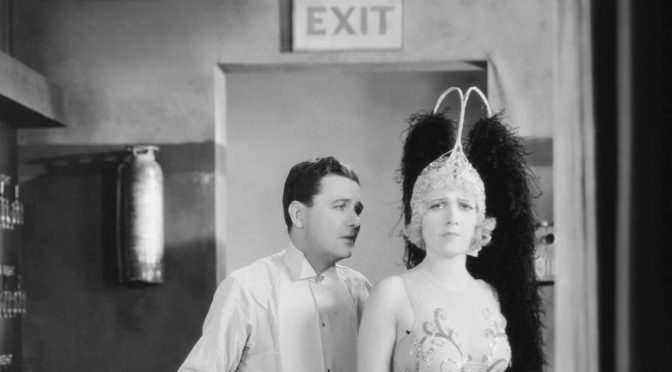Best Picture: The Broadway Melody
The Other Nominees: Alibi; Hollywood Revue; In Old Arizona; The Patriot
In addition to winning the second-ever Best Picture Oscar, The Broadway Melody was the highest-grossing film of 1929, and it spawned a franchise of films like The Broadway Melody of 1936, The Broadway Melody of 1938, and The Broadway Melody of 1940. By all accounts, it should be a bigger deal than it is, but unfortunately it’s the kind of movie that forces you to ask: can a movie be important even if no one cares about it?
This is what I call The Avatar Corollary. Avatar won a richly deserved Oscar for its transformative use of special effects, and it grossed 2 billion dollars at the box office; statistically speaking, you and everyone you know saw it at least once. But when was the last time you heard anyone talk about it? Moreover, do you know anyone who considers Avatar their favorite movie? I mean, when Avatar came out, people were killing themselves because they couldn’t live on Pandora, and now no one gives a shit. The Broadway Melody, one of the most popular musicals ever made, should be talked about in the same way that people talk about The Jazz Singer, with its pioneering use of sound. So why isn’t it?
I think the big difference is: The Broadway Melody isn’t very good. This is the lowest-rated Best Picture winner on Rotten Tomatoes, which is saying something when you take into account films like Crash and Around the World in 80 Days.
The Broadway Melody follows Eddie Kearns (Charles King), a writer and performer of show tunes. He’s just written a real humdinger, appropriately titled “The Broadway Melody,” and guys, the movie really wants to show off this song. By which I mean, we hear it three times before the hour mark; we don’t hear a song that isn’t “The Broadway Melody” until forty minutes into the film. The song lands Eddie a starring role in a revue put on by Francis Zanfield (Eddie Kane), a stand-in for Florenz Ziegfeld (who we’ll see more of in 1936’s The Great Ziegfeld). The revue, appropriately enough, is called The Broadway Melody, and to help him with the song Eddie brings in the Mahoney sisters, Hank (Bessie Love) and Queenie (Anita Page). Before you ask, yes, one of the sisters’ name is Hank, and no, it’s never explained.
Page and Love are fun to watch, and they have good chemistry together. Love in particular has a nice way of delivering the script’s nonstop stream of quips; perusing an expensive room service menu, she asks, “Did they run out of everything besides dollar signs?” Eddie and Hank seem to be in love (they talk about getting married), but there’s one big hiccup: Eddie is a fucking creep, which may or may not have been the film’s intention.
The problem of The Broadway Melody is twofold: characterizations are, by and large, paper thin, and beyond that it’s boring way more often than it should be. Musicals, when well executed, are charming and engrossing (like Little Shop of Horrors). But TBM commits the cardinal sin of being repetitive (like in Nine, where a good 90% of the songs are about Daniel Day-Lewis’s character Guido). For a movie that takes such pains to romanticize Broadway, New York, and following your dreams, The Broadway Melody has very little understanding of what makes any of those things work on screen. I don’t blame the cast for this; most of them, most notably Page and Love, are game and winsome, and occasionally rise above the material. If I were to blame anyone, it would be director Henry Beaumont, who has very little sense of pacing or staging. This is one of the rare films about singers that would work better if it weren’t a musical.
The narrative doesn’t make much sense either. Queenie becomes the talk of the town after appearing in one of the revue’s numbers – but not in a starring role, mind you; no, she stands motionless on the prow of a ship and everyone loses their shit. Soon Jacques Warriner (Kenneth Thomson) wants her as a kept woman, offering her an apartment and a Rolls Royce, and Eddie starts professing his love for her any time Hank leaves the room. The love triangle isn’t even a bad idea, but Eddie’s constantly shifting affection makes him look like a star fucking groupie. He’s impossible to sympathize with. Likewise, Jacques (whose name, when said aloud, is meant to sound like Jack Warner) turns out to be super creepy and rapey, at one point holding Queenie tightly and telling her “No, I won’t let you go; you’re going to stay right here with me.”
There’s no reason for Queenie to become a starlet overnight; it’s the equivalent of an actress becoming the toast of the town for appearing as an extra in a Saturday Night Live sketch. There are storytelling beats that The Broadway Melody knows it has to hit, but it has no idea how to get from A to B.
It’s easy to see why The Broadway Melody won Best Picture. The Academy is nothing if not self-congratulatory, and that impulse is on full display only a year after its inception. “Look at us,” it seems to be saying, “we figured out how to put songs on film!” But it doesn’t hold up very well, despite the best efforts of Page and Love (the latter of whom scored a Best Actress nomination for playing Hank). I can’t fully recommend it to anyone except douchebags like myself. It’s a stop on the tour, and very little else.
Previously: Wings
Next Up: All Quiet on the Western Front






